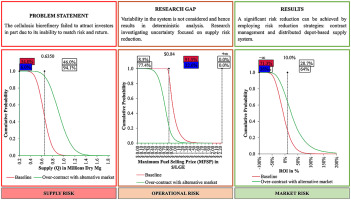Renewable and Sustainable Energy Reviews ( IF 15.9 ) Pub Date : 2020-01-03 , DOI: 10.1016/j.rser.2019.109677 Saleh Mamun , Jason K. Hansen , Mohammad S. Roni

|
This paper evaluates supply, operational- and market-risk reduction opportunities for the case where management at a cellulosic biorefinery adopts a supply chain design based on a distributed depot concept. In contrast to the conventional feedstock-supply system, a supply chain based on a network of depots providing feedstock to a biorefinery employs geographically distributed depots where feedstock undergoes preprocessing into densified pellets, thus allowing feedstock to be transported a greater distance. This study used simulation methods to show that distributed depots may work as a risk absorber for a cellulosic biorefinery. Compared to a base case, a distributed depot supply system reduced the operational and market risk by 17.5% and 5%, respectively. Moreover, when contract management and alternatives markets were considered, a reduction of supply, operational, and market risk, by approximately 48%, 69%, and 35%, respectively, were observed. The expected return on investment (ROI) increased from −4% to 33%. However, this positive ROI largely depends on assuming commoditization and the creation of intermediate markets for alternative, merchandisable products.
中文翻译:

供应,运营和市场风险降低的机会:纤维素生物炼制厂的风险管理
本文针对纤维素生物精炼厂的管理采用基于分布式仓库概念的供应链设计的情况,评估了减少供应,运营和市场风险的机会。与传统的原料供应系统相比,基于将原料提供给生物精炼厂的仓库网络的供应链采用地理位置分散的仓库,在该仓库中,原料经过预处理后被加工成致密的小球,从而使原料可以更远地运输。这项研究使用模拟方法表明,分布式仓库可以作为纤维素生物精炼厂的风险吸收者。与基本情况相比,分布式仓库供应系统分别将运营和市场风险降低了17.5%和5%。此外,当考虑合同管理和替代市场时,观察到供应,运营和市场风险分别降低了约48%,69%和35%。预期投资回报率(ROI)从−4%增加到33%。但是,这种正的ROI在很大程度上取决于假设商品化以及为替代性可销售产品建立中间市场。


























 京公网安备 11010802027423号
京公网安备 11010802027423号